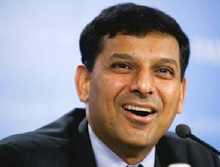Raghuram Rajan cautions govt on deficit-driven growth
30 Jan 2016
 Reserve Bank governor Raghuram Rajan has warned against generating economic growth through creation of additional money or through debt, saying that any deviation from the fiscal consolidation path will hurt stability of the economy.
Reserve Bank governor Raghuram Rajan has warned against generating economic growth through creation of additional money or through debt, saying that any deviation from the fiscal consolidation path will hurt stability of the economy.
India needs to take a cautious approach in deciding on any deviation from the fiscal consolidation path to push growth, Rajan said while delivering the CD Deshmukh lecture, organised by NCAER, in New Delhi on Friday.
''More spending could hurt debt dynamics,'' he said during his speech ahead of the Budget.
Rajan highlighted that the government understands the importance of bond market confidence, but said, there was little understanding of this among the ''common man''.
Rajan said that macroeconomic stability during the global turmoil cannot be risked and the government and RBI should continue to bring down inflation. There is a wider public discussion whether India should yet again postpone fiscal consolidation path with some arguing that it could lead to higher growth, he added.
"As Brazil's experience suggests, the enormous costs of becoming an unstable country far outweigh any small growth benefits that can be obtained through aggressive policies. We should be very careful about jeopardising our single most important strength during this period of global turmoil - macroeconomic stability," he said here.
Rajan also pointed out that that the current economic situation also does not warrant accumulation of debt to support slow growth.
"Unfortunately, the growth multipliers on government spending at this juncture are likely to be much smaller, so more spending will probably hurt debt dynamics. Put differently, it is worth asking if there really are very high- return investments that we are foregoing by staying on the consolidation path" he said.
Rajan said that consolidated fiscal deficit of the centre and states rose to 7.2 per cent in 2015 from 7 per cent in the previous year after the NDA government last year deviated from the fiscal consolidation path, postponing reduction in fiscal deficit target by a year.
"So we actually expanded the aggregate deficit in the last calendar year. With UDAY, the scheme to revive state power distribution companies, coming into operation in the next fiscal, it is unlikely that states will be shrinking their deficits, which puts pressure on the centre to adjust more," he said.
Originally, the target was to bring down fiscal deficit to 3.6 per cent of the GDP in 2015-16 but it has been postponed by a year. Now, government is targeting 3.9 per cent in the current fiscal.
Rajan said deviation from the fiscal consolidation path could push up government bond yields, both because of the greater volume of bonds to be financed and potential loss of government credibility on future consolidation.
He said that fall in inflation has been on account of the "joint work of the government and the RBI, aided to some extent by the fall in international commodity prices. This is no mean achievement given two successive droughts that would have, in the past, pushed inflation into double digits".
He also rued the weakening of the fight against inflation despite the success on the inflation front.
He said: "Let me reiterate that macroeconomic stability relies immensely on policy credibility, which is the public belief that policy will depart from the charted course only under extreme necessity, and not because of convenience. If every time there is any minor difficulty, we change the goal posts, we signal to the markets that we have no staying power.
"Let me therefore reiterate that we have absolutely no intent of departing from the inflation framework that has been agreed with the Government. We look forward to the Government amending the RBI Act to usher in the monetary policy committee, further strengthening the framework."
Macroeconomic stability, Rajan stressed, would be the platform on which "we will build the growth that will sustain our country for many years to come, no matter what the world does".
RBI is scheduled to announce the next bi-monthly monetary policy on 2 February.
Rajan also cautioned against raising tariffs to protect the domestic industries which are facing problems.
"Clearly, there are industries in trouble. We should, however, be particularly careful about raising tariffs at a time when costs are falling everywhere - aside from the inflationary impact, for every happy domestic businessman whose prices are raised by the imposition of tariffs on imports, we have an unhappy domestic businessman whose costs are raised by the very same tariffs, as well as unhappy consumers," he added.



















